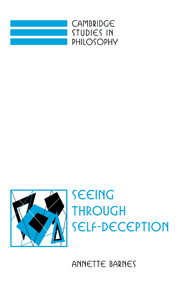
-
Select format
-
- Publisher:
- Cambridge University Press
- Publication date:
- November 2009
- January 1998
- ISBN:
- 9780511583353
- 9780521620147
- 9780521038775
- Dimensions:
- (216 x 138 mm)
- Weight & Pages:
- 0.4kg, 194 Pages
- Dimensions:
- (216 x 138 mm)
- Weight & Pages:
- 0.265kg, 196 Pages
You may already have access via personal or institutional login- Series:
- Cambridge Studies in Philosophy
Book description
What is it to deceive someone? And how is it possible to deceive oneself? Does self-deception require that people be taken in by a deceitful strategy that they know is deceitful? The literature is divided between those who argue that self-deception is intentional and those who argue that it is non-intentional. In this study, Annette Barnes offers a challenge to both the standard characterization of other-deception and characterizations of self-deception, examining the available explanations and exploring such questions as the self-deceiver's false consciousness, bias and the irrationality and objectionability of self-deception. She arrives at a non-intentional account of self-deception that is deeper and more complete than alternative non-intentional accounts and avoids the reduction of self-deceptive belief to wishful belief.
Reviews
"Recommended for upper-division undergraduate and graduate students, faculty, and researchers." Choice
"We are grateful to Annette Barnes for courageously shedding light on a difficult and important problem." Béla Szabados, Philosophy in Review
Contents
Metrics
Full text views
Full text views help Loading metrics...
Loading metrics...
* Views captured on Cambridge Core between #date#. This data will be updated every 24 hours.
Usage data cannot currently be displayed.
Accessibility standard: Unknown
Why this information is here
This section outlines the accessibility features of this content - including support for screen readers, full keyboard navigation and high-contrast display options. This may not be relevant for you.
Accessibility Information
Accessibility compliance for the PDF of this book is currently unknown and may be updated in the future.


